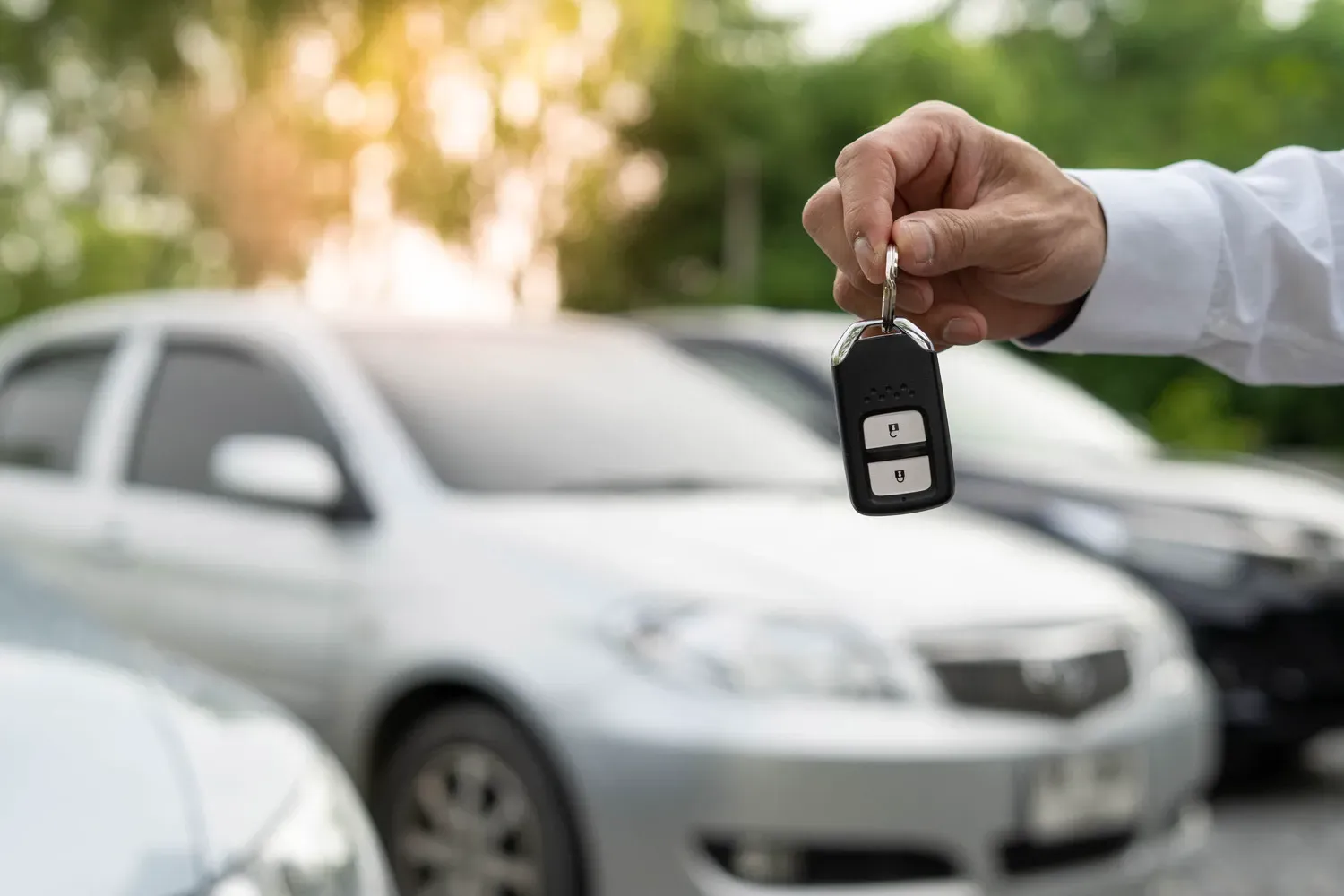
Before committing to a new ride, weigh the options: lease or buy. This guide outlines the key factors to consider, from financial implications to personal preferences. Whether you prioritize the flexibility of leasing or the ownership perks of buying, understanding the choice empowers smarter car decisions.
You are so ready for a new ride. You’ve done your research, gotten your financial ducks in a row, and maybe even selected the make, model, color, and trim package you want. But before you march into the dealership to make it happen, one question remains: “Should I lease or buy a car?”
It’s smart to get educated upfront on leasing versus buying a car so you know exactly how you’ll afford your new wheels.
Leasing vs. buying a car
So, what is the best deal–buying or leasing a car? The answer is … it depends (sorry!). Ultimately, the lease vs. buy decision depends as much on your finances (income, cash flow, and debt load) as it does on your personal tastes and goals. But don’t worry—we’ll walk you through the details.
Say you’re looking for a car you can eventually hand down to your kids, or you’ve got plenty of cash for a nice down payment. Then, buying may suit you best. If, on the other hand, you like the idea of upgrading to a newer model every few years or don’t want to think about things like trade-in value, then leasing may be the route.
Let’s review the pros and cons of leasing vs. buying and the factors that will help you make the right decision. You’ll also learn how your choice of lender can impact your car buying or leasing experience. For example, did you know credit union car loans often consider a broader range of factors when determining lending rates, meaning you’re more likely to qualify for a better rate at your local credit union? First, let’s cover some important details.
What is a lease, and how does it work?
You can think of a lease as similar to renting your vehicle for an agreed-upon period — typically 24 or 36 months, though longer terms are available. Your up-front costs may include the first month’s payment, a refundable security deposit, and other assorted fees, such as registration. All in all, you’re putting roughly a couple of thousand dollars down to drive the car off the lot.
Advantages of leasing a car
One of the main selling points of a lease is it gets you into a new (or new-ish) car for a couple of years, which you can then return to the dealer in exchange for another new car. This way, you’re always driving a relatively new vehicle covered by the manufacturer’s warranty. Oil changes and other routine maintenance are often covered for the lease's life.
There are plenty of additional upshots:
- Car quality. Leasing often allows you to drive a higher-priced, better-equipped car than you might be able to buy since monthly lease payments are typically lower than loan payments.
- Less expense. You’re only paying for the car’s depreciation over the lease life rather than all the finance taxes and other costs that accrue over a multi-year car loan.
- Depreciation, what depreciation? You won’t care how much value the car could lose by the end of your lease because you won’t own it, anyway.
Disadvantages of leasing a car
While leasing sounds like a sweet deal — perpetually new car, modest up-front costs — it does have downsides to consider. Since you don’t own the vehicle, each lease payment is a recurring financial transaction that nets you zero equity (meaning, you’ll have nothing to resell to recoup some of your investment). Or, suppose you fall in love with the car and want to buy it when your lease expires. Depending on the length of your lease and market conditions, the vehicle’s lease buy-out cost may be higher than its market value.
Other pitfalls to consider:
- Mileage restrictions. Planning a cross-country road trip any time soon? Leasing contracts limit the number of miles you can put on the car. If you exceed the allowed mileage, you’ll pay an average of 10-50 cents for each extra mile.
- Wear and tear charges. If the vehicle shows excess wear and tear, you’ll pay for that when you turn it in.
- Expendables are your responsibility. Drive through a construction zone and leave with a nail in your tire? It’ll likely be up to you to cover its replacement cost.
- Early termination or turn-in fees. If you decide you don’t like the car or the payments are too much, expect to pay a hefty fee to terminate the lease agreement early. Your contract may also include a turn-in fee, regardless.
What about buying a car with cash or a loan?
Buying a car is different from leasing because you will own the car outright immediately if you pay with cash or once you’ve paid off your lender’s car loan.
If you take out a loan to purchase the vehicle, expect to make a down payment that is 10% to 20% of its value. And while shopping around for the best rates, don’t forget to include your local credit union in the process. Credit union car loans are among the most competitive in the U.S., so you won’t need to look into how to refinance your car loan later.
Advantages of buying a car
The most significant advantage to buying a car is owning it outright once you have paid it off. Any future payments will be toward vehicle maintenance, like oil changes and new tires. If you maintain the car properly, gas costs aside, you could enjoy nearly expense-free driving for many years.
Other advantages to buying a car include:
- Customization. Unlike a leased car, you can truly make the vehicle your own. Want an upgraded sound system or tinted windows? Go for it. Plaster that bumper with stickers. You do you!
- Flexibility. You can rack up as many miles on the vehicle as you want without watching the odometer.
- Equity. You’ve earned the right to sell your car whenever you’d like. Even if it’s not fully paid off, you can likely make back at least a portion of your investment if you decide to sell.
Disadvantages of buying a car
One potential drawback of buying a car is that you’ll likely need to spend quite a bit more upfront than if you lease. While the average down payment on a new car is roughly 12% of its value, financing the remaining 88% means you’ll face higher monthly payments that you may need to spread over more years, costing you more in interest. As a result, you could end up paying significantly over the original sticker price.
Consider these potential disadvantages:
- No variety. The average car loan lasts 72 months. That’s six years of your life carrying a monthly payment for the same car. Alternatively, you could lease and experience driving two (or more) new vehicles during that time.
- Depreciation. While you're diligently paying off your car loan each month, the vehicle is depreciating. You’re building equity, yes, but as they say, the instant you drive that car off the dealer’s lot, it’s worth less than you paid for it.
- Escalating expense. The longer you keep a car, the more repairs will pile up. You could even find yourself upside down on your car loan if you start to owe more on the car than it’s worth.
Further resources on whether you should lease or buy a car
Still trying to decide whether to lease or buy? Here are some unbiased sources to help with your decision:
- Find a low rate. Consumer Reports’ How to Shop for a Car Loan. Tips for obtaining a low-interest rate, even if your credit isn’t great.
- Know before you go. Five Tips for Buying a Car the Smart Way. NPR’s brief consumer guide to the car-buying process.
- Get the credit union perspective. Pros and Cons of Buying vs. Leasing a Car provides insight from a credit union on your vehicle acquisition options.
The better you understand which financing approach is right for your budget and lifestyle, the closer you’ll be to making the car of your dreams a reality. Find a credit union partner that’s happy to help with the process.
Did you know?
Credit unions are member-based not-for-profit institutions that prioritize helping local community members meet their financial needs, including auto loans. Unlike banks, credit unions do not need to turn a profit, which allows them to offer more competitive interest rates. And whereas banks approve loans based primarily on a consumer’s credit history, credit unions often make loans to help members with a mixed credit history to improve their credit track record.
